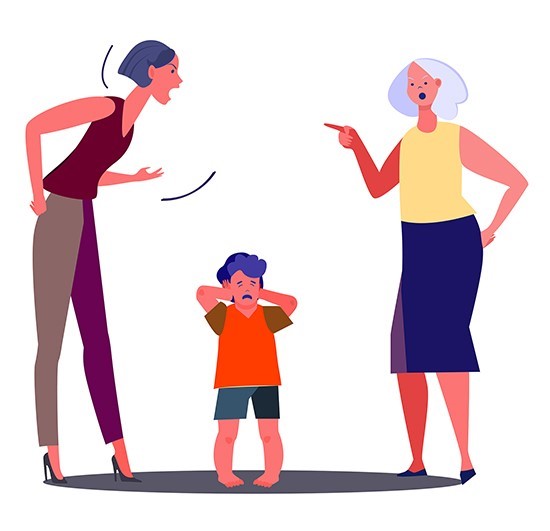There is no
hard-and-fast manual to parenting, it is something that usually comes naturally
to parents and they learn as they go. Basic things such as feeding, clothing,
and other ways of generally caring for a
child come as second nature. The
challenge comes when caring for the children goes beyond simply meeting their
everyday needs.
اضافة اعلان
As the child grows up, it becomes
increasingly necessary for parents to choose a parenting style that best suits
the child’s character and needs.
Parents will find themselves at some
point making decisions that are either stricter or more indulgent than their
usual, but for the most part, they fall into a general parenting style.
While there are many ways and different
variations of parenting styles, developmental psychologist Diana Baumrind first
identified and divided parenting styles into three distinct categories:
authoritarian, authoritative, and permissive.
Parenting
styles in Jordan
A study
carried out by the
Jordan University of Science and Technology aimed to look at
the impact of parenting style on the well-being of Jordanian adolescents in the
north of the country. In a sample of 500 student aged 13—16, it found that the
most popular style adopted by Jordanian parents is the authoritative, followed
by permissive, then authoritarian; however, percentages were in close proximity
of each other. The study concluded that Jordanian parenting style had a
positive impact on adolescents’ self-esteem, but a negative impact on their
mental health.

Another study done at the
Michigan State University, which aimed to look at parenting styles used with preschool
children in Jordan, showed the same results. It also found that Jordanian
fathers tend to be more permissive than mothers, and that both mothers and
fathers used an authoritative parenting style more with their sons than with
their daughters.
Authoritarian
parenting
Authoritarian
parents tend to go by one main rule, “my way or the highway”, and answer
usually with “because I said so”. They tend to be strict and inflexible, and
their rules must be followed with no exceptions. They value discipline over
communication and believe that being in control of every aspect of their
child’s life will benefit the child, without taking much of their inputs or
feelings into consideration, as they expect them to be obedient.
Parents who follow an authoritarian
parenting style tend to use harsh discipline methods with strict rules and
schedules for their children to follow. Most of them set rules without
explaining the reasoning behind them and impose their own consequences with no
pre-emptive warning whenever a rule is broken.
Punishments in this style of
parenting tend to be harsh, and can even be physically and emotionally abusive.
Instead of using discipline to teach
their children how to solve problems or learn from their mistakes in order to
make better choices, they are more invested in making their children feel sorry
for their mistakes. And while many of those parents believe that this is the
best way for them to raise well-behaved children, their choice of parenting
comes at a price.
Parents who follow an authoritarian parenting style tend to use harsh discipline methods with strict rules and schedules for their children to follow.
Research has shown that authoritarian
parents who believe in adherence to authority rather than valuing their
children’s input and teaching them self-control and how to manage their
behavior can lead to their children growing up to be unable to act on their
own or make any decisions for themselves. They often have trouble expressing
themselves and have self-esteem issues because they grew up with
parents who
did not value their opinion.
Children who grew up with authoritarian
parents may even become aggressive or hostile, focused on releasing their
pent-up anger toward their parents. Many say that strict parents make sneaky
children; such is true for many of the children who become good liars in order
to avoid punishment.
Permissive
parenting
Permissive
parenting is the exact opposite of authoritarian parenting, with parents
tending to let their children have most of the control. Permissive parents tend
to set rules, but rarely ever enforce them and do not follow through with consequences,
as most broken rules are not even recognized. They tend to be very lenient and
only interfere when there is a major problem.
With permissive
parenting, there is a
lot of affection and warmth; they are usually kind and loving, but might get
frustrated when their child is defiant, yet still choose not to interfere. They
forgive easily and believe that “kids will be kids”. They believe their lack of
interference will help their children become self-reliant free thinkers who
should not be held down by strict rules and structure, but be allowed to
explore the world on their own.
They also fear that placing rules and
consequences will interfere negatively with their child’s development.
Permissive parents aim to become their children’s friends, rather than their
parents, and encourage their children to talk to them about their problems yet
do not offer any substantial solutions nor discourage them from making poor
choices.
However, rules are necessary and the
downside to such parenting style is that children who grow up with permissive
parents tend to exhibit behavioral problems, as they do not respect authority,
rules, or consequences. That is because they grew up not being required to have
good manners, did not have many responsibilities, and believe that no matter
what they do, they will not be punished for it.

According to research done at
Cornell University, children with permissive parents tend to remain egocentric and lack
self-control. They are more likely to struggle academically and are at higher
risk of developing health problems such as obesity, as parents tend to struggle
with limiting junk food intake. Studies have also shown a link between
permissive parenting and increased alcohol use and higher rates of school
misconduct among teenagers.
Authoritative
parenting
Authoritative parenting is the mixture of authoritarian and permissive
styles. Authoritative parents are kind and loving, but they are also firm, with
set boundaries that their children are expected to abide by. They are neither
overly strict nor overly indulgent, and their expectations are realistic.
According to research done at Cornell University, children who grew up with
authoritative parents display social competence, a high sense of
responsibility, and independence.
Authoritative
parents understand the importance of allowing their children to make
age-appropriate decisions, and validate their children’s feelings while
allowing them to be vulnerable and negotiate the rules where it makes sense.
They also understand the importance of
open communication and the amount of
support required in order for their children to grow up successful, confident,
and well-mannered.
This style of
parenting usually involves having reasonable expectations through providing
meaningful experiences and a certain level of freedom that grows with age. It
is also necessary that they understand when parental intervention is required
and when they should allow their children to figure it out by themselves with
minimal guidance.
Parents who
understand that making mistakes and failing is a normal, expected, and even
necessary part of life will ensure that their children grow up to be
emotionally mature. Their
children will know how to handle frustrations and
hurtful experiences that will allow them to become independent and turn to
their parents for advice only when needed. Authoritative parents focus on
teaching their children how to label their feelings, as well as understand and
regulate their emotions in order to become balanced and ready to handle any
situation with maturity and grace. Most importantly, they are role models to
their children and exhibit all the values that they wish to instill.
Through consistent
discipline and consideration of feelings, this parenting style can have many
positive effects on the child, starting with a nurturing relationship while
still providing clear and consistent guidelines, as well as consistent rewards
and consequences.
Children with
authoritative parents are more responsible and are able to manage their aggression
while maintaining high self-esteem and self-confidence. They are also more
likely to be more responsive, assertive, self-regulated, and cooperative with
those around them. They are, most importantly, happier.
Read more Education
Jordan News




